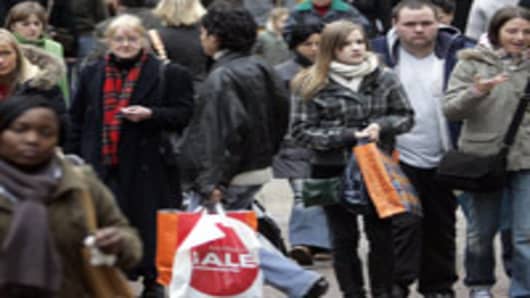More businesses are throwing a lifeline to the unemployed in an attempt to jumpstart sales.
Major companies like Hyundai, General Motors, Ford, JetBlue, Jos. A. Bankand Walgreenare promising potential customers that if they lose their jobs after making a purchase, they can either return the item for a refund or get some type of payment protection.
The promotions are meant to woo consumers, who might otherwise be afraid of making larger purchases during the recession. The companies also hope to strengthen their image by appearing sympathetic to Americans at a time when the unemployment rate is already at its highest level since 1983 and widely expected to top 9-10 percent between now and its peak.
“This is a great way for the organization to generate loyalty in the future when the customer is, presumably back on track,” said Linda Pophal, CEO and owner of Strategic Communications, a communication planning company. “There is likely to be significant positive word-of-mouth generated by such activities.”
Cars Come First
Hyundai started the trend in January when it began its Assurance Program, letting customers return their cars within a year of buying them if they lose their jobs involuntarily. The promotion, available only to customers who bought new cars that are financed or leased, will refund the fair value of the car. Hyundai is also forgiving $7,500 in negative equity.
The Ford and General Motors plans, announced Tuesday are a little different from Hyundai’s.
Instead of returning the car, Ford will make payments of up to $700 a month for 12 months for purchasers who lose their jobs. Ford’s program covers cars that are purchased between now and June 1, 2009.
General Motors will pay a maximum of $500 a month on leases or financed cars for those that lose their job. The General Motors plan is eligible for vehicles bought between April 1 and April 30, 2009.
Hyundai says its sales are up 4.9 percent in 2009 from the same period last year, which the company attributes to the new plan as well as other unrelated promotions, like its Super Bowl commercial.
Thus far, no vehicles have been returned to Hyundai but that is because customers have to make at least two scheduled payments to be eligible for the Assurance Program. The company expects the first wave of customers who are eligible to return their vehicles to begin to do so in the next couple of weeks.
Drugstore chain Walgreen also announced a plan Tuesday that will provide free basic health care at their clinics for people who have lost their jobs on or after March 31, 2009, do not have health insurance and have used the clinic at least once. The care applies to common colds, skin conditions and other minor illnesses, although customers will have to pay for any prescriptions. Normally such visits cost $59 and up.
Meanwhile, JetBlue is giving anyone who bought a ticket between February 17 and June 1 a chance to refund it if a job loss occurs. JetBlue sweetened its deal this month by giving refunds on vacation packages booked from the company between March 17 and June 1, 2009.
Bryan Baldwin, a spokesperson at the airline, said one of the reasons why the company decided to go with this promotion is because customers were waiting until the last minute to purchase flights instead of buying tickets in advance. The company is not releasing specifics on whether the promotion has increased sales, but Baldwin said that some people have begun returning tickets since the promotion began.
In the retail sector, Jos. A. Bank is offering all customers a refund of up to $199 if they buy a suit between March 16 and April 9, 2009. The refund is only given to those who lose their job involuntarily between April 16 and July 1, 2009. But their promotion has a twist—customers get to keep the suit.
“We run a lot of sales and we thought that we needed to do something extra besides just price to get people to buy more and take the edge off committing to a purchase,” says Neal Black, CEO of Jos. A. Bank.



